Judaism is a particularly transient religion. Over thousands of years of history and a long tradition of debate, determining what is essential to being Jewish is perplexing; No one answer can suffice. The complexities of the ethnoreligious group remain subjective and dynamic. However, answers to the Jewish question have demographic implications. Converging how people answer this question with demographic shifts predicts the future of the Jewish faith and identity.
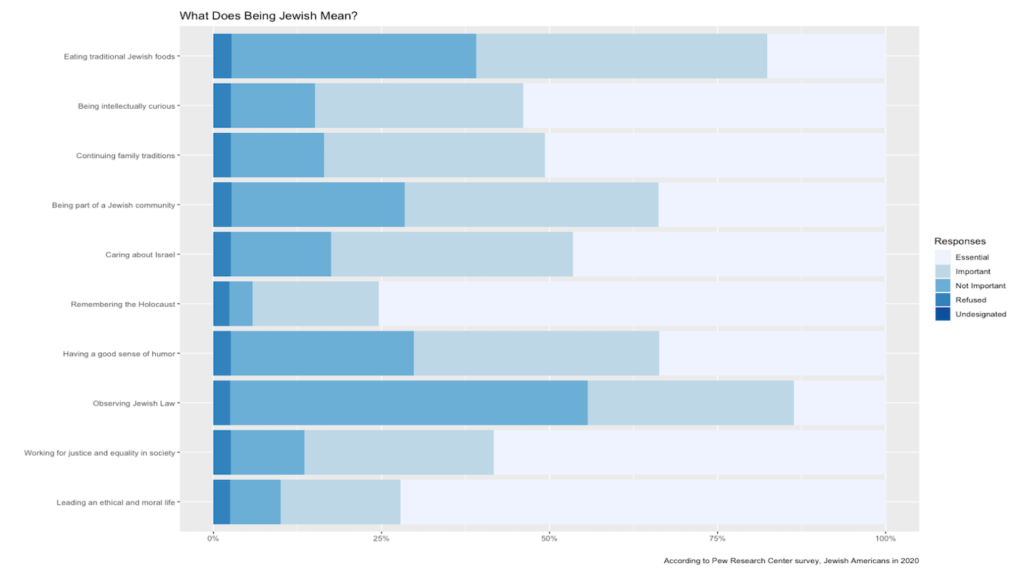
Overall, American Jews believe the most essential element of being Jewish is remembering the Holocaust. This sentiment is especially prevalent amongst Conservative and Reform Jews. Orthodox Jews, on the other hand, emphasize this less. In a close second, Jews surveyed from all denominations were likely to say that living an ethical and moral life is essential to being Jewish. For all denominations except Orthodoxy, this also manifested as working towards social justice. While one of the lowest priorities on average, Orthodox Jews place nearly as much emphasis on observing Halacha, or Jewish law, as other denominations place on social justice. Orthodox Jews are over five times more likely to say that following Jewish law is essential to being Jewish than the average Jew.
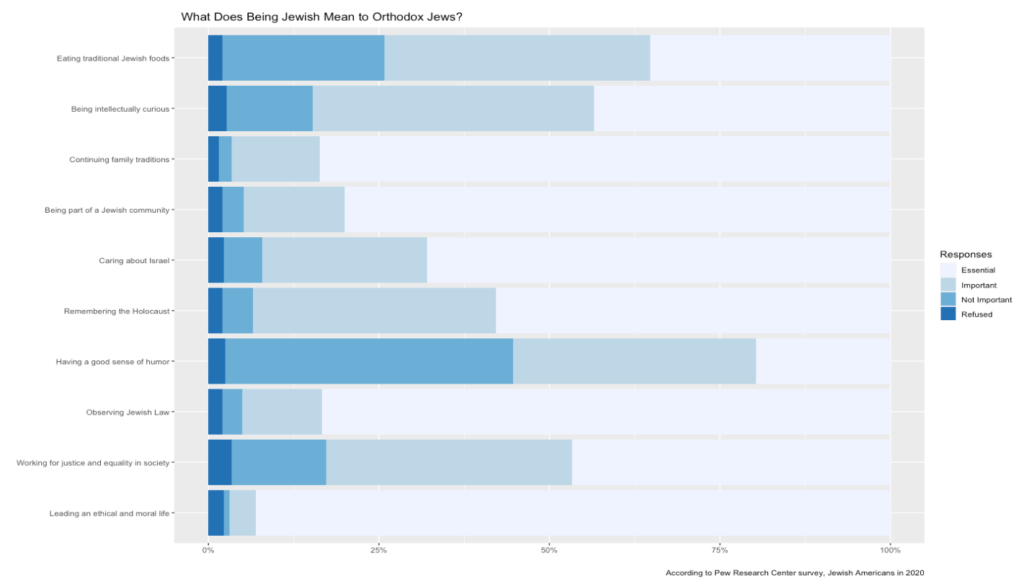
Orthodox Jews are the most anomalous group in this breakdown. Orthodox Jews are also most likely to say eating Jewish food is essential to their identity and least likely to say intellectual curiosity or having a good sense of humor is critical to being Jewish. Overall, Orthodoxy emphasizes religious and traditional elements over cultural and historical ones. Orthodoxy claims historical continuity, which downplays their investment in secular facets of Jewishness. This separation may contribute to understanding why, as opposed to other denominations, which are increasingly transient, not many Orthodox Jews are leaving the fold, and not many are joining it. (Ausubel et al.)
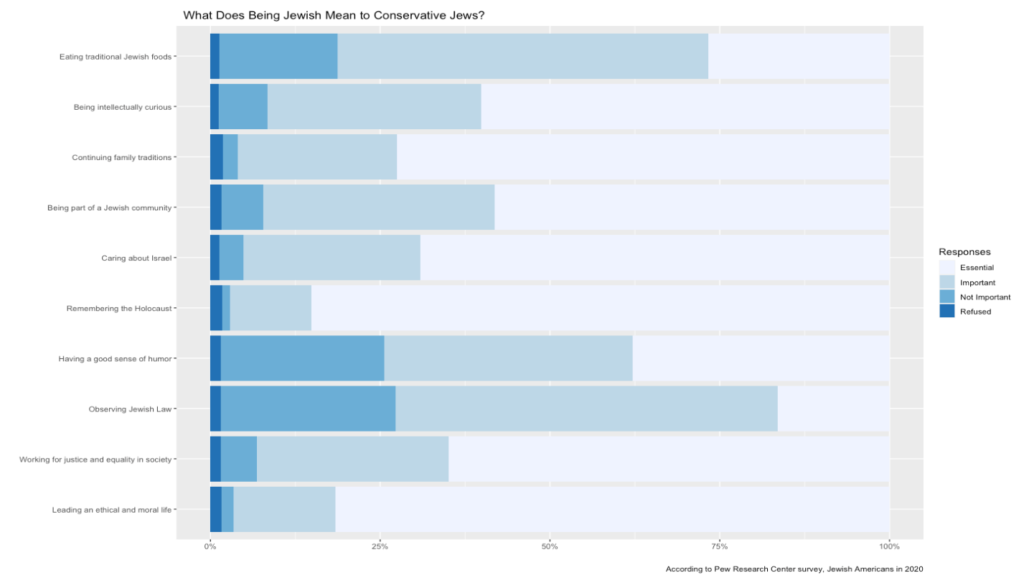
Conservative Jews are slightly more likely to believe that observing Jewish law is essential to being Jewish than other non-Orthodox denominations. However, like Orthodox Jews, they emphasize the importance of maintaining family traditions, caring about Israel, and being part of a Jewish community which are lower priorities among other non-Orthodox groups. According to these answers, Conservative Judaism is a combination of a similar traditionalism to that in Orthodoxy and the social-justice-oriented ethics of other non-Orthodox communities. This complicated balance may contribute to the dwindling population of Jews identifying as Conservative. (Diamant)
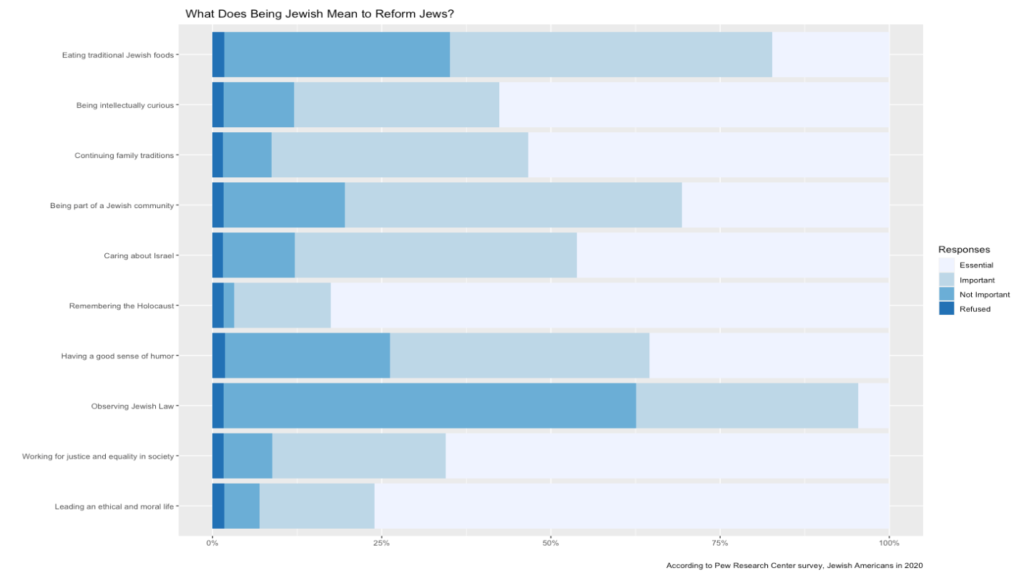
The low prioritization of community among American Jews, especially in Reform Judaism, shows that some find more meaning in individual rather than communal practices. This may be connected to why despite Reform Judaism growing, non-denominationalism is growing twice as fast. (Ausubel et al.) Jews who identify with smaller left-wing denominations, including Reconstructionism, Renewal, Humanism, and Liberal/ Progressive, answered these questions similarly to Reform Jews, except they were more likely to say that intellectual curiosity and community are essential to being Jewish. The greater emphasis on intellectual curiosity suggests people in smaller left-leaning denominations are deconstructing with hopes for a new vision for Judaism. With an elevated focus on social justice, these new forms of practice are likely to be more progressive than existing denominations.
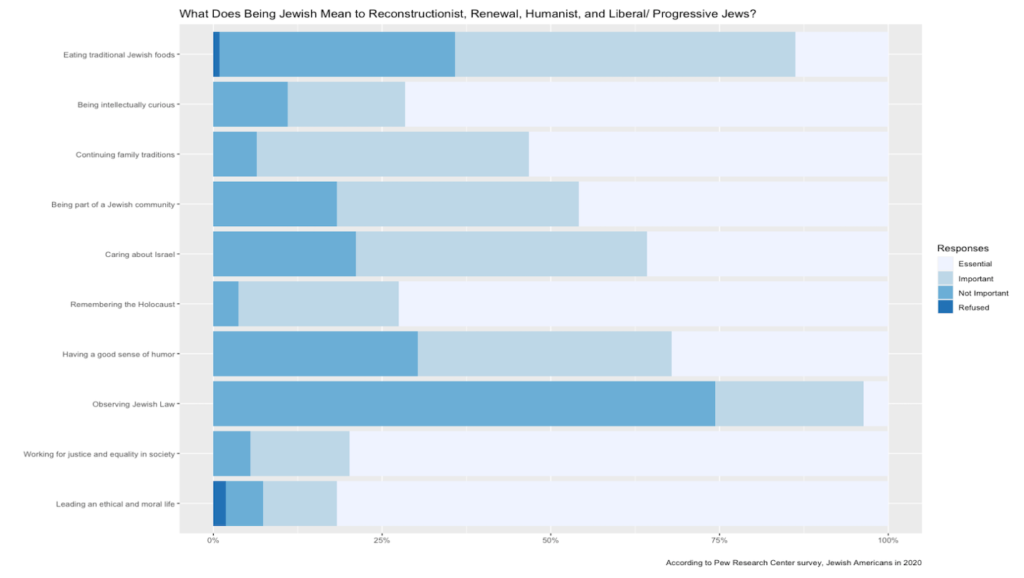
The priorities of each denomination reflect their demographics. The uniqueness of what is essential to Orthodox Jews echoes its separation from other Jewish sects. While not attractive, high reproduction rates are increasing the popularity of Orthodox ideals of traditional religiosity. The complicated balance of priorities within Conservative Judaism mirrors its demographic challenges. The decline of Conservative Judaism demonstrates a polarization between ideals of traditionalism and social justice. The de-emphasis on communal values in Reform Judaism reflects the move to nondenominationalism. Overall, non-Orthodox Jews show signs of realignment towards a new form of progressive Judaism. Despite differences, American Jewry is connected through its dedication to its history and commitment to ethical life.
Sources:
Ausubel, Jacob, et al. “Denominational Switching among U.S. Jews: Reform Judaism Has Gained, Conservative Judaism Has Lost.” Pew Research Center, Pew Research Center, 22 June 2021, www.pewresearch.org/fact-tank/2021/06/22/denominational-switching-among-u-s-jews-reform-judaism-has-gained-conservative-judaism-has-lost/.
Diamant, Jeff. “How Younger U.S. Jews Are Similar to – and Different from – Older U.S. Jews.” Pew Research Center, Pew Research Center, 8 June 2021, www.pewresearch.org/fact-tank/2021/06/08/how-younger-u-s-jews-are-similar-to-and-different-from-older-u-s-jews/.
“Jewish Americans in 2020 Archives.” Pew Research Center’s Religion & Public Life Project, 2020, www.pewresearch.org/religion/dataset/jewish-americans-in-2020/.
Original data vizualizations